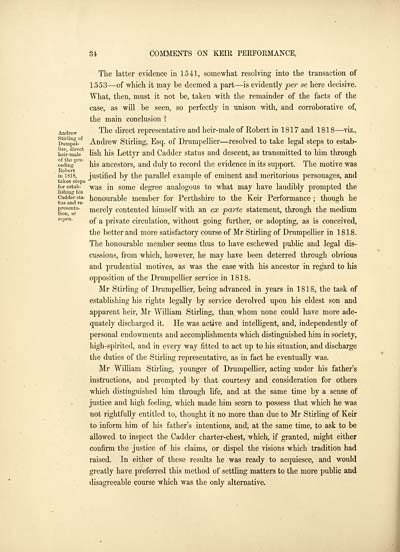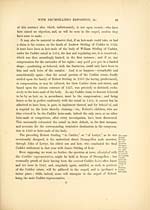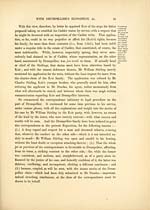Download files
Complete book:
Individual page:
Thumbnail gallery: Grid view | List view

34 COMMENTS ON KEIR PERFORMANCE,
The latter evidence in 1541, somewhat resolving into the transaction of
1553 — of which it may be deemed a part — is evidently per se here decisive.
What, then, must it not be, taken with the remainder of the facts of the
case, as will be seen, so perfectly in unison with, and corroborative of,
the main conclusion 1
Andrew The dircct representative and heir-male of Robert in 1817 and 1818— viz.,
Dumpfi-"^ Andrew Stirling, Esq. of Drumpellier — resolved to take legal steps to estab-
heiir-maTe Hsh liis Lcttyr and Cadder status and descent, as transmitted to him through
ceding'' his auccstors, and duly to record the evidence in its support. The motive was
in 1818, justified by the parallel example of eminent and meritorious personages, and
tj3.K6S steps
forestab- was in somc degree analogous to what may have laudibly prompted the
Cadder sta- honourable member for Perthshire to the Keu" Performance : though he
tus and re- "
S^tt*^ merely contented himself with an ex parte statement, through the medium
supra. q£ ^ priyate circulation, without going further, or adopting, as is conceived,
the better and more satisfactory course of Mr Stirling of Drumpellier in 1818.
The honourable member seems thus to have eschewed public and legal dis-
cussions, from which, however, he may have been deterred through obvious
and prudential motives, as was the case with his ancestor in regard to his
opposition of the Drumpellier service in 1818.
Mr Stirling of Drumpellier, being advanced in years in 1818, the task of
estabhshing his rights legally by service devolved upon his eldest son and
apparent heir, Mr William Stirling, than whom none could have more ade-
quately discharged it. He was active and intelligent, and, independently of
personal endowments and accomplishments which distinguished him in society,
high-spu'ited, and in every way fitted to act up to his situation, and discharge
the duties of the Stii-ling representative, as in fact he eventually was.
Mr WiUiam StirHng, younger of Drumpellier, acting under his father's
instructions, and prompted by that courtesy and consideration for others
which distinguished him through life, and at the same time by a sense of
justice and high feeling, which made him scorn to possess that which he was
not rightfully entitled to, thought it no more than due to Mr Stirling of Keir
to inform liim of his father's intentions, and, at the same time, to ask to be
allowed to inspect the Cadder charter-chest, which, if granted, might either
confirm the justice of his claims, or dispel the visions which tradition had
raised. In either of these results he was ready to acquiesce, and would
greatly have preferred this method of settling matters to the more public and
disagreeable course which was the only alternative.
The latter evidence in 1541, somewhat resolving into the transaction of
1553 — of which it may be deemed a part — is evidently per se here decisive.
What, then, must it not be, taken with the remainder of the facts of the
case, as will be seen, so perfectly in unison with, and corroborative of,
the main conclusion 1
Andrew The dircct representative and heir-male of Robert in 1817 and 1818— viz.,
Dumpfi-"^ Andrew Stirling, Esq. of Drumpellier — resolved to take legal steps to estab-
heiir-maTe Hsh liis Lcttyr and Cadder status and descent, as transmitted to him through
ceding'' his auccstors, and duly to record the evidence in its support. The motive was
in 1818, justified by the parallel example of eminent and meritorious personages, and
tj3.K6S steps
forestab- was in somc degree analogous to what may have laudibly prompted the
Cadder sta- honourable member for Perthshire to the Keu" Performance : though he
tus and re- "
S^tt*^ merely contented himself with an ex parte statement, through the medium
supra. q£ ^ priyate circulation, without going further, or adopting, as is conceived,
the better and more satisfactory course of Mr Stirling of Drumpellier in 1818.
The honourable member seems thus to have eschewed public and legal dis-
cussions, from which, however, he may have been deterred through obvious
and prudential motives, as was the case with his ancestor in regard to his
opposition of the Drumpellier service in 1818.
Mr Stirling of Drumpellier, being advanced in years in 1818, the task of
estabhshing his rights legally by service devolved upon his eldest son and
apparent heir, Mr William Stirling, than whom none could have more ade-
quately discharged it. He was active and intelligent, and, independently of
personal endowments and accomplishments which distinguished him in society,
high-spu'ited, and in every way fitted to act up to his situation, and discharge
the duties of the Stii-ling representative, as in fact he eventually was.
Mr WiUiam StirHng, younger of Drumpellier, acting under his father's
instructions, and prompted by that courtesy and consideration for others
which distinguished him through life, and at the same time by a sense of
justice and high feeling, which made him scorn to possess that which he was
not rightfully entitled to, thought it no more than due to Mr Stirling of Keir
to inform liim of his father's intentions, and, at the same time, to ask to be
allowed to inspect the Cadder charter-chest, which, if granted, might either
confirm the justice of his claims, or dispel the visions which tradition had
raised. In either of these results he was ready to acquiesce, and would
greatly have preferred this method of settling matters to the more public and
disagreeable course which was the only alternative.
Set display mode to:
![]() Universal Viewer |
Universal Viewer | ![]() Mirador |
Large image | Transcription
Mirador |
Large image | Transcription
Images and transcriptions on this page, including medium image downloads, may be used under the Creative Commons Attribution 4.0 International Licence unless otherwise stated. ![]()
| Permanent URL | https://digital.nls.uk/95371199 |
|---|
| Description | A selection of almost 400 printed items relating to the history of Scottish families, mostly dating from the 19th and early 20th centuries. Includes memoirs, genealogies and clan histories, with a few produced by emigrant families. The earliest family history goes back to AD 916. |
|---|

